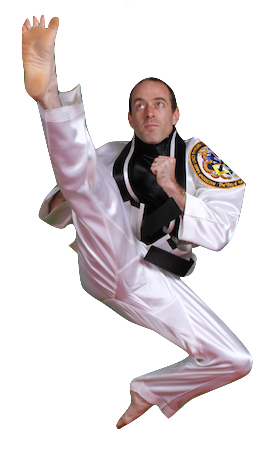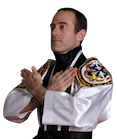
Mastership
When I was in college, I taught Taekwondo at the campus gym. A fellow undergraduate, who had earned a black belt in another martial art style, began attending my classes. Min-ho was flexible and fast, and he frequently fought in international tournaments. Hoping to learn from his experience, I asked him to show me some sparring tactics. He agreed, and began to demonstrate an elaborate series of kicks.
“How does that work in sparring?” I asked.
“When you do the first kick,” Min-ho said, “your opponent will react by moving to the left. Then you follow up with the second kick. Your opponent then will duck to the right, and you will score with the third kick.”
His predictions seemed counter-intuitive to me. My own instinctive response to the kicks would have been different.
“What if your opponent doesn’t move to the left or duck to the right?” I pressed.
“Oh, he will,” Min-ho assured me.
We began to spar. To my surprise, I quickly dominated the match. It was not that my skill or speed was superior. But Min-ho seemed surprised by my every move. He would begin an attack and then abandon it when he realized I was out of range of his intended follow-up. I easily jammed him, exposed his openings and upset his plans.
I realized that Min-ho had learned a very specific set of skills, which had little application beyond their context. Because all of the students in his martial arts style learned the same sparring drills, they all were conditioned to react to attacks in the same way. Min-ho therefore could predict their responses to his kicks, and could fashion a sequence that took advantage of those responses.
As long as Min-ho confined himself to sparring people from within his style, he would do well. But his mechanical approach was useless against a partner who had not internalized the rote responses that Min-ho had learned. When faced with unexpected movements, his programming short-circuited.
Min-ho was a good athlete. But he was no master. Mastership requires more than memorization. Anyone who is reasonably intelligent and determined can learn to perform choreographed attacks and defenses. But the master understands why those attacks and defenses work and uses that knowledge to respond effectively even when there is no choreography. Mastership, in other words, is the ability to apply principles beyond their context.
Mastership is not merely the accumulation of information. It is a way of thinking. Many American universities have “general education” requirements. Students must take courses in science, literature, history and other fields in order to develop broad-based knowledge. Harvard University, similarly, has what it calls a “core curriculum.” But at least on paper, Harvard wants its students to do more than simply acquire information from a variety of fields. Here is how the university describes its philosophy:
This distinction -– between “the digestion of a specific quantum of information” and developing “approaches to knowledge” –- is the fundamental distinction between a Min-ho and a master. It is the difference between rote memorization and analytical thinking.
Min-ho's approach to sparring was to digest a specific quantum of information, which was useful under particular circumstances. When the circumstances changed, his skills failed him. Mastership means reaching beyond the present circumstances. The master discerns underlying principles and applies them to all areas of his or her life.
You probably have heard the aphorism, “Give a man a fish and you have fed him for a day. Teach a man to fish and you have fed him for a lifetime.” The master goes a step further. He not only knows how to fish but also understands why his fishing technique works. And using that understanding, he figures out how to hunt, or even how to impress his boss or motivate his employees or close sales.
I had a child student once who reminded me of the Peanuts character Pigpen. He always seemed to leave a mess in his wake. After he used the bathroom at my dojahng, there were paper towels all over the floor, and Band-Aids from the first aid cabinet had fallen into the sink. When confronted, he was contrite. But then he found new ways to make a mess: distractedly scratching his name into my mats while sitting in class, or scribbling on my sales office table with a pen.
The lesson he learned each time was always confined to its context: Don’t trash the bathroom. Don’t scratch the mats. Don’t write on the table. But he failed to extract the broader lessons: Don’t make a mess. Treat other people’s property with respect. Treat other people with respect. Think before you act.
As a martial artist, mastership means translating lessons learned in the dojahng into behavior off of the mat. Miyamoto Musashi taught that “the true science of martial arts means practicing them in such a way that they will be useful at any time, and to teach them in such a way that they will be useful in all things.” This book is filled with anecdotes from my experiences as a martial arts instructor. My goal was to draw lessons from those anecdotes and then to apply those lessons beyond their context so that they are “useful in all things.” Together, those lessons form the foundation of mastership:
- Embrace the Process
- Be Aware
- Be True to Yourself
- Welcome Your Weaknesses
- Find Mastery Within
- Conquer Your Ego
- Pass It On
Embrace the Process
We tend to think of mastership as a culmination, an end point. To master something suggests that we have gained complete knowledge and proficiency. And there is some truth to this notion. The martial arts master, for instance, is a skilled technician with a deep understanding of the principles and values that underlie the art. But true mastership is a process, not a destination. And achieving mastery requires us to embrace that process.
A few times a year, I attend weapons and self-defense seminars taught by senior masters. In addition to the many lower-level black belts who attend these seminars, at least one master usually participates. And the seminar instructor always makes a point of acknowledging the master’s presence -– not just as a show of respect but also to emphasize the importance of continuing to learn even after achieving mastership.
When people learn that I am a sixth-degree black belt, they often ask, “How many degrees are there?” On hearing that there are nine degrees in my style of Taekwondo, they naturally believe that I have nearly reached “the end.” So I hasten to point out that although it has taken me twenty-five years to get this far, it may take another twenty-five for me to achieve the rank of ninth degree, if I get there at all. Though I am about to become a master, a long journey still lies ahead.
Focusing on this journey does not mean abandoning the idea of goals. It simply means recognizing that goals are milestones, not end points. As each goal is accomplished, a new challenge emerges. The master savors both the milestones and the steps leading to them.
Be Aware
Viewing mastership as a process enables us to shift our gaze to the present. In Buddhism, this is known as mindfulness, or being “in the moment.” It enables us to achieve the state of mushin no shin (“mind no-mind”) discussed in Chapter Three, where we can step outside of ourselves. We then can assess how we are feeling, what we are thinking, and how closely our choices reflect our values. In this way, embracing the present enhances our awareness of our actions, our appreciation of our surroundings, and our understanding of ourselves.
In his unfinished opus, Tao of Jeet Kune Do, Bruce Lee wrote, “Understanding requires not just a moment of perception, but a continuous awareness, a continuous state of inquiry without conclusion.” Awareness has been a recurring theme throughout this book, because it is so central to mastership. Respect for others demands an awareness of their humanity. Respect for yourself requires an awareness of your feelings and needs. Knowledge comes from an awareness of all that we do not yet know. Humility is an awareness of our limitations. Gratitude is an awareness life’s rewards.
To enter a “state of inquiry without conclusion” means not only to embrace the process but also to allow yourself to observe without judgment. For example, consider the anxieties and insecurities that often impede our progress. Remember my friend who wanted to be a writer but squandered her opportunity by missing a deadline. Her subconscious fear of failure kept her from trying. The first step toward overcoming that fear was becoming aware of it.
But even if you are aware of your motivations, you can remain paralyzed by them. The critical next step is to detach from them. As Bruce Lee put it, “Do not condemn or approve; merely observe.” If you castigate yourself for your weaknesses, it is difficult to overcome them. But if you permit yourself to fail, then success comes much more easily.
Be True to Yourself
Observing without judgment enables you to know yourself. But mastership requires more than self-knowledge. It also requires you to be true to yourself. Remember that having vision means not only knowing where you want to go but also understanding the steps that will take you there. If you know that quality time with your family is what fulfills you, then the choices you make should be designed to carve out that time.
When I became a public defender, I promised myself that I would not let the job overwhelm my personal life. It was important to me to have as much time with my wife as possible. I wanted to be able to train and teach Taekwondo, to hike on the weekends, and to see my friends regularly. But I seemed unable to resist taking on extra responsibilities at work. I helped plan the office holiday party. I agreed to be on a committee studying legal ethics issues. I volunteered to mentor new lawyers. And with each of these decisions, my schedule became busier and the time available for my passions diminished. My choices were in conflict with my vision. I was not being loyal to myself.
Too often, there is a gap between what we want and what we choose to do. Mastership means aligning our self-perception with our actions. It combines a consciousness of our values with the integrity to make choices that reflect those values.
Welcome Your Weaknesses
If we are self-aware and act with integrity, then we cannot help but notice our deficiencies. And one of the key elements of mastership is the ability to welcome your weaknesses. As Aikido master George Leonard put it in his classic book, Mastery, “To be a learner, you’ve got to be willing to be a fool.”
Welcoming weakness does not mean surrendering to it. Indeed, once we allow ourselves to acknowledge our weaknesses, we can begin to grow stronger. Only when we accept that we do not know everything can we truly learn. Only by admitting that we are wrong can we begin to make things right.
The fool, in Leonard’s formulation, does not worry about seeming infallible. He experiments freely, trying new things without fear of failure. This willingness to look silly liberates him and enables him to grow.
Find Mastery Within
To be willing to be a fool, we cannot concern ourselves with how others perceive us. For example, my stepmother is a poet. Over the years, she has written enough poems to fill several books. But poetry can be a lonely pursuit, with few external rewards. Though she has published the occasional poem and been a finalist for several awards, she has not yet sold a manuscript. And even if she does publish a book of poetry, the chance that it will be read by more than a handful of people is exceedingly slight. If she were motivated only by the desire for acclaim, she would have lost hope and stopped writing long ago. She writes, then, for herself.
Bruce Lee wrote, “Art reaches its greatest peak when devoid of self-consciousness. Freedom discovers man the moment he loses concern over what impression he is making or about to make.” The key to achieving mastership is not to define ourselves by how others perceive us. The master, in the words of Sun Tzu, “advances without coveting fame and retreats without fearing disgrace.”
Conquer Your Ego
Remember Jimmy, the impulsive boy who punched a kid in the nose for taking his place in the lunch line? Jimmy lashed out because he felt disrespected. And his sense of justice was offended by the thought that the kid would get away with cutting in line. But his response was counter-productive. He not only lost his place in line, but he was the one who was punished, instead of the other boy.
Mastership is the ability to keep our ego from interfering with our goals. I once got an email from a mother whose 4-year-old child had just begun training with me. In surprisingly harsh language, she wrote that she was unimpressed with the program. She criticized the assistant instructor who taught the class, saying he had no control over the students. She said that if she had not signed up for a three-month membership, she would stop bringing her son to class right now.
I was tempted to respond angrily to her email. I wanted to defend myself and my assistant. I considered pointing out that her child was the most disruptive student in the class. I fantasized about suggesting to her that it was no wonder her child behaved so poorly, with the example she set.
In short, I wanted to vindicate my ego. But I also believed that her son would benefit as much as anyone from the discipline that martial arts training instills. And I wanted to keep him as my student. So I set my ego aside and focused on my goal. I wrote a polite email thanking her for her comments. I told her that like me, my assistant instructor is always working to improve his teaching skill. I assured her that we both welcomed her feedback. And I expressed my regret that she was not satisfied. When her son’s introductory membership ended a couple of months later, she paid up front for a six-month renewal membership.
Pass It On
Most of my discussion of mastership so far has focused on the self: Knowing yourself, being true to yourself, getting over yourself. But there is a reason that so many of the anecdotes in this book come from my interactions with my students. I believe that mastership expresses itself most profoundly in its effects on others. In the words of Lao Tzu, the master “does not hoard. The more he does for others, the more he has himself; the more he gives to others, the more his bounty increases.”
The master is, above all, a teacher and a leader. In Songahm Taekwondo, to be eligible for mastership you must have at least 200 students. This requirement recognizes that it is not enough to dedicate ourselves to our own growth. The measure of our mastership is found in our impact our students. That is why, upon becoming a master, my full title will be “Master Instructor.”


